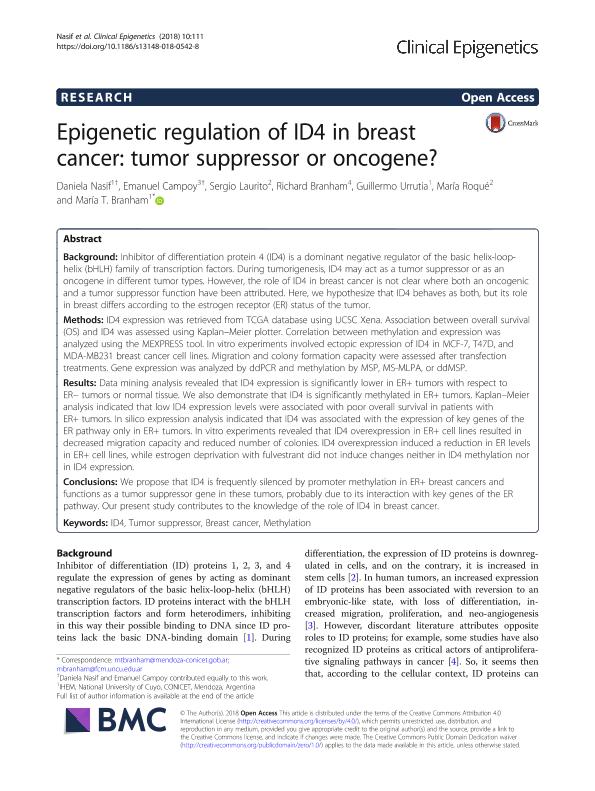Artículo
Epigenetic regulation of ID4 in breast cancer: Tumor suppressor or oncogene?
Nasif, Daniela Lucía ; Campoy, Emanuel Martin
; Campoy, Emanuel Martin ; Laurito, Sergio Roberto
; Laurito, Sergio Roberto ; Branham, Richard Lacy
; Branham, Richard Lacy ; Urrutia, Guillermo Alejandro
; Urrutia, Guillermo Alejandro ; Roque Moreno, Maria
; Roque Moreno, Maria ; Branham, Maria Teresita
; Branham, Maria Teresita
 ; Campoy, Emanuel Martin
; Campoy, Emanuel Martin ; Laurito, Sergio Roberto
; Laurito, Sergio Roberto ; Branham, Richard Lacy
; Branham, Richard Lacy ; Urrutia, Guillermo Alejandro
; Urrutia, Guillermo Alejandro ; Roque Moreno, Maria
; Roque Moreno, Maria ; Branham, Maria Teresita
; Branham, Maria Teresita
Fecha de publicación:
08/2018
Editorial:
BioMed Central
Revista:
Clinical Epigenetics
ISSN:
1868-7083
Idioma:
Inglés
Tipo de recurso:
Artículo publicado
Clasificación temática:
Resumen
Background: Inhibitor of differentiation protein 4 (ID4) is a dominant negative regulator of the basic helix-loop-helix (bHLH) family of transcription factors. During tumorigenesis, ID4 may act as a tumor suppressor or as an oncogene in different tumor types. However, the role of ID4 in breast cancer is not clear where both an oncogenic and a tumor suppressor function have been attributed. Here, we hypothesize that ID4 behaves as both, but its role in breast differs according to the estrogen receptor (ER) status of the tumor. Methods: ID4 expression was retrieved from TCGA database using UCSC Xena. Association between overall survival (OS) and ID4 was assessed using Kaplan-Meier plotter. Correlation between methylation and expression was analyzed using the MEXPRESS tool. In vitro experiments involved ectopic expression of ID4 in MCF-7, T47D, and MDA-MB231 breast cancer cell lines. Migration and colony formation capacity were assessed after transfection treatments. Gene expression was analyzed by ddPCR and methylation by MSP, MS-MLPA, or ddMSP. Results: Data mining analysis revealed that ID4 expression is significantly lower in ER+ tumors with respect to ER- tumors or normal tissue. We also demonstrate that ID4 is significantly methylated in ER+ tumors. Kaplan-Meier analysis indicated that low ID4 expression levels were associated with poor overall survival in patients with ER+ tumors. In silico expression analysis indicated that ID4 was associated with the expression of key genes of the ER pathway only in ER+ tumors. In vitro experiments revealed that ID4 overexpression in ER+ cell lines resulted in decreased migration capacity and reduced number of colonies. ID4 overexpression induced a reduction in ER levels in ER+ cell lines, while estrogen deprivation with fulvestrant did not induce changes neither in ID4 methylation nor in ID4 expression. Conclusions: We propose that ID4 is frequently silenced by promoter methylation in ER+ breast cancers and functions as a tumor suppressor gene in these tumors, probably due to its interaction with key genes of the ER pathway. Our present study contributes to the knowledge of the role of ID4 in breast cancer.
Palabras clave:
BREAST CANCER
,
ID4
,
METHYLATION
,
TUMOR SUPPRESSOR
Archivos asociados
Licencia
Identificadores
Colecciones
Articulos(IANIGLA)
Articulos de INST. ARG. DE NIVOLOGIA, GLACIOLOGIA Y CS. AMBIENT
Articulos de INST. ARG. DE NIVOLOGIA, GLACIOLOGIA Y CS. AMBIENT
Articulos(IHEM)
Articulos de INST. HISTOLOGIA Y EMBRIOLOGIA DE MEND DR.M.BURGOS
Articulos de INST. HISTOLOGIA Y EMBRIOLOGIA DE MEND DR.M.BURGOS
Citación
Nasif, Daniela Lucía; Campoy, Emanuel Martin; Laurito, Sergio Roberto; Branham, Richard Lacy; Urrutia, Guillermo Alejandro; et al.; Epigenetic regulation of ID4 in breast cancer: Tumor suppressor or oncogene?; BioMed Central; Clinical Epigenetics; 10; 1; 8-2018
Compartir
Altmétricas



